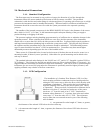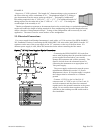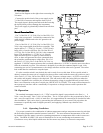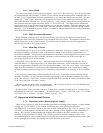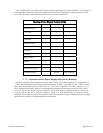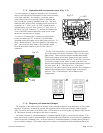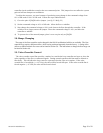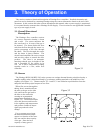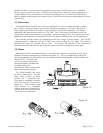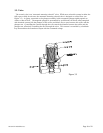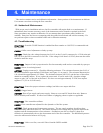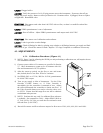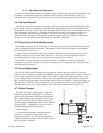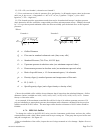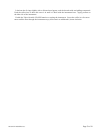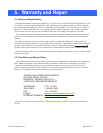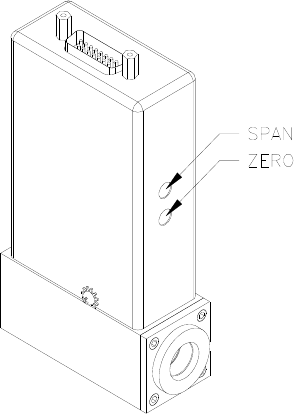
140-072011 200/202 Series Page 20 of 24
CAUSE: Plugged orifice.
ACTION: Verify the presence of a 10-50 psig pressure across the instrument. If present, shut off gas
supply and power supply. Remove orifice per Section 4.9. Examine orifice. If plugged, clean or replace
as applicable. Reassemble valve.
SYMPTOM: Flow meter reads other than 0.00 VDC with no flow, or there is a small flow when flow
meter reads 0.00 VDC.
CAUSE: ZERO potentiometer is out of adjustment.
ACTION: Shut off all flow. Adjust ZERO potentiometer until output reads 0.00 VDC.
SYMPTOM: Flow meter out of calibration and nonlinear.
CAUSE: Leaks in gas inlet or outlet fittings.
ACTION: Check all fittings for leaks by placing soap solution on all fittings between gas supply and final
destination of gas. Check flow meter for leaks. Replace “O” rings if required or recalibrate as necessary.
4.3. ADJUSTMENTS
4.3.1. Calibration Procedure: (Figure 4.1)
5) NOTE: Steps 5 and 6, adjusting the SPAN pot and performing a calibration run, will require the use
of a calibration reference.
1) Connect power cable to D connector as specified in Section
2.7. Allow instrument to warm up for 30 minutes with 10%
flow and instrument in AUTO position.
2) After the warm up period, set the flow to zero and insure
that, indeed, there is zero flow. Wait for 2 minutes.
3) Set ZERO (R13 on 15 Volt / R20 for 24 Volt) potentiometer
for 0.000 VDC output.
4) Turn on gas supply to inlet of instrument. Use the Valve
Override CLOSE feature or, if Valve Override is
unavailable, give the controller a command of zero. Adjust
the orifice underneath the controller to obtain zero flow. If
the Valve Override feature was used to close the valve, set it
to AUTO. Ensure that full range flow can still be obtained
at minimum inlet pressure.
5) NOTE: Perform this step only if a calibrated flow reference
is available. Set command to 100%. Adjust SPAN (R18 on
15 Volt / R2 for 24 Volt) pot until the flow reference reads
full scale flow (5.000 VDC).
6) Record flow meter and flow reference outputs for flow rates of 20%, 40%, 60%, 80% and 100%.
Figure 4.1



